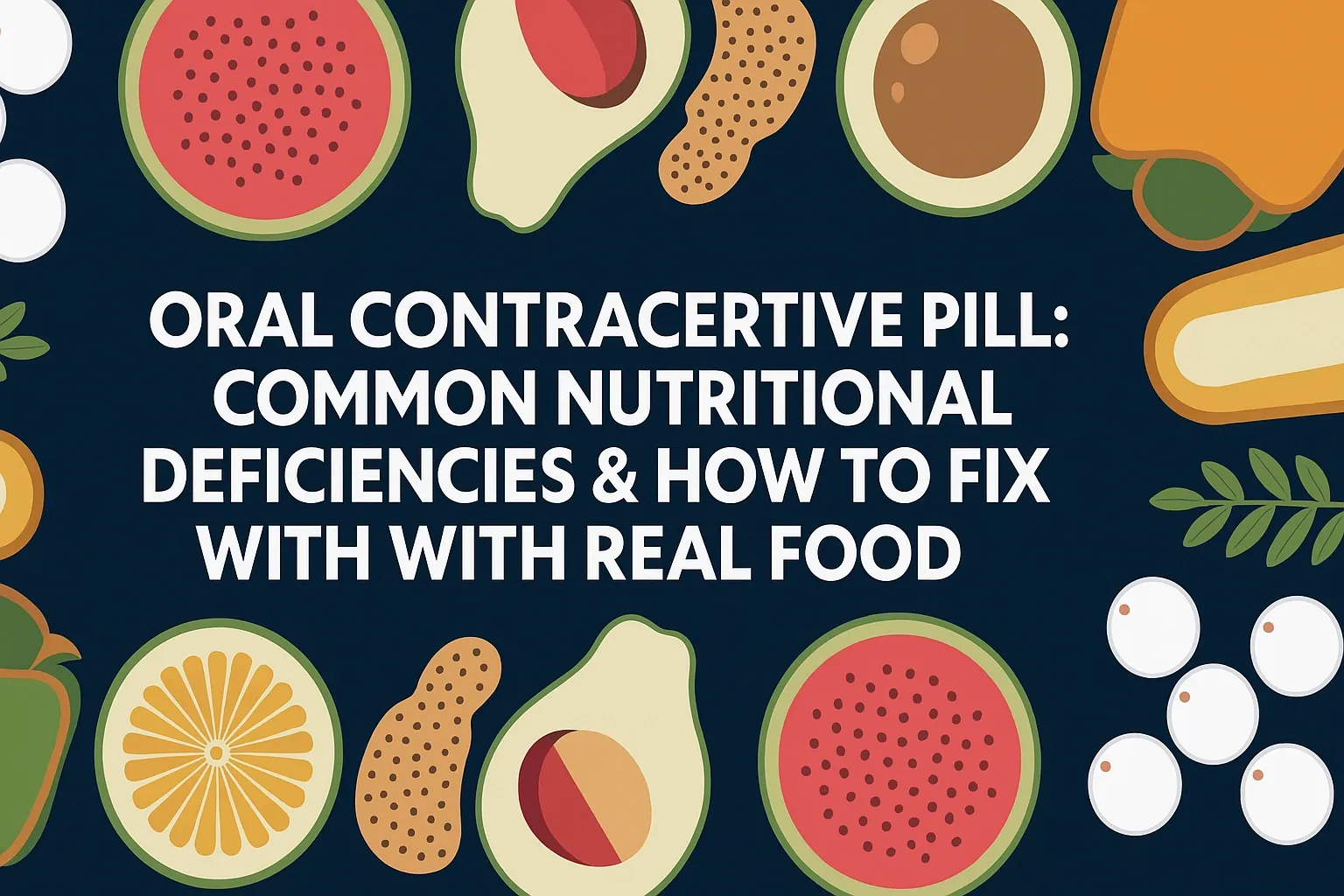The Hidden Nutritional Cost of Birth Control
While the oral contraceptive pill has revolutionized women's health and autonomy since its introduction, there's an aspect that doesn't always make it into the conversation with your doctor: nutritional deficiencies.
As a nutritionist at Fugen Health, I've seen firsthand how these hidden deficiencies can impact energy levels, mood, and overall wellbeing. The good news? Your kitchen might already contain many of the solutions.
Let's dive into why the pill affects your nutrient levels and how everyday foods can help restore balance without breaking the bank or requiring complicated supplements.
How Does the Pill Affect Your Nutrient Levels?
The oral contraceptive pill works by introducing synthetic hormones that alter your body's natural hormone balance. These hormones don't just affect fertility—they influence how your body processes, absorbs, and utilizes various nutrients.
The pill primarily affects nutrient levels in three ways:
- Altered metabolism: Synthetic hormones change how your body breaks down certain nutrients
- Increased requirements: Your body needs more of specific nutrients to process these additional hormones
- Impaired absorption: The pill can reduce your gut's ability to absorb certain nutrients efficiently

Key Nutrient Deficiencies and Food-Based Solutions
1. B Vitamins: The Energy Foundations
B Vitamins Affected: B2 (Riboflavin), B6, B12, and Folate (B9)
How the Pill Depletes These Nutrients:
The pill increases the metabolism of B vitamins, particularly folate. This is especially important because folate deficiency during pregnancy can increase neural tube defects risk—something to consider if you plan to stop the pill to conceive.
Real Food Solutions:
For Folate (B9):
- Dark leafy greens (spinach, kale, collard greens)
- Legumes (lentils, chickpeas, black beans)
- Asparagus
- Avocados
- Grass-fed Beef liver (a nutrient powerhouse if you can stomach it)
For Vitamin B2 (Riboflavin):
- Eggs
- Almonds and other nuts
- Mushrooms
- Grass-fed Beef liver
- Greek yogurt and milk
For Vitamin B6:
- Chicken and turkey
- Tuna and salmon
- Sweet potatoes
- Bananas
- Pistachios
For Vitamin B12:
- Shellfish (clams, oysters)
- Beef and lamb
- Eggs and dairy products
- Fish
Simple Meal Idea:
Start your day with a B-vitamin-packed breakfast: scrambled eggs with sautéed spinach and mushrooms, topped with a sprinkle of toasted pine nuts. Add half an avocado on the side for extra folate.
2. Vitamin C: More Than Just Immune Support
How the Pill Depletes This Nutrient:
Oral contraceptives can lower blood levels of vitamin C, which is crucial not just for immunity but also for collagen production, iron absorption, and antioxidant protection.
Real Food Solutions:
- Bell peppers (particularly red ones, which have more vitamin C than oranges!)
- Kiwi fruits
- Strawberries and other berries
- Broccoli and cauliflower
- Tomatoes
Simple Habit Tip:
Keep a container of sliced bell peppers and strawberries in your fridge for easy snacking that naturally boosts your vitamin C levels.
3. Vitamin E: The Fertility Protector
How the Pill Depletes This Nutrient:
Studies show that women on the pill often have lower levels of vitamin E, which is ironic since this vitamin plays a crucial role in reproductive health and fertility.
Real Food Solutions:
- Sunflower seeds and almonds
- Hazelnuts and peanuts
- Spinach and other dark greens
- Avocados
- Olive oil
Simple Addition:
Sprinkle a tablespoon of sunflower seeds on your morning oatmeal or yogurt for an easy vitamin E boost.

4. Minerals: The Foundation of Biochemical Balance
Magnesium: The Relaxation Mineral
How the Pill Depletes This Nutrient:
The pill can significantly reduce magnesium levels, which might explain why some women experience increased tension, muscle cramps, or sleep issues while on birth control.
Real Food Solutions:
- Dark chocolate (at least 70% cacao)
- Pumpkin seeds
- Black beans
- Spinach and Swiss chard
- Whole grains like brown rice and quinoa
Simple Habit Tip:
Start your day with a cup of magnesium-rich cacao to support relaxation and mood throughout the day.
Zinc: The Hormone Balancer
How the Pill Depletes This Nutrient:
Zinc is crucial for immune function, skin health, and hormone production. The pill can disrupt zinc absorption and utilization, leaving many women deficient.
Real Food Solutions:
- Oysters (the highest natural source of zinc)
- Grass-fed beef
- Pumpkin seeds
- Cashews
- Shellfish
Simple Addition:
Add a serving of grass-fed beef jerky to your afternoon snack regime.
Selenium: The Thyroid Supporter
How the Pill Depletes This Nutrient:
Selenium levels can drop in women taking oral contraceptives, potentially affecting thyroid function and antioxidant capacity.
Real Food Solutions:
- Brazil nuts (just 2-3 nuts meet your daily needs!)
- Yellowfin tuna
- Halibut and sardines
- Turkey
Simple Habit Tip:
Keep a small container of Brazil nuts at your desk and eat 2-3 daily for optimal selenium levels.
Creating a Pill-Friendly Meal Plan
Rather than thinking about individual nutrients, focus on creating balanced meals that naturally address multiple deficiencies at once. Here's what that might look like:
Breakfast Ideas:
- Spinach and mushroom omelette with a side of berries
- Overnight oats with chia seeds, Brazil nuts, and sliced kiwi
- Greek yogurt topped with pumpkin seeds, almonds, and fresh strawberries
Lunch Ideas:
- Salmon salad with leafy greens, bell peppers, and sunflower seeds
- Lentil soup with dark leafy greens and a side of whole grain bread
- Grass fed steak and vegetable wrap with avocado
Dinner Ideas:
- Grass-fed beef stir-fry with broccoli, bell peppers, and brown rice
- Turkey meatballs with quinoa and sautéed Swiss chard
- Baked oysters with a side of sweet potato and steamed asparagus
Snack Ideas:
- Dark chocolate and almonds
- Sliced bell peppers with hummus
- Hard-boiled eggs with a piece of fruit

When to Consider Professional Support
While food should always be your first medicine, sometimes targeted supplementation or professional guidance is necessary, especially if you're experiencing symptoms like:
- Persistent fatigue
- Mood changes or depression
- Hair loss
- Dry skin or brittle nails
- Muscle cramps or spasms
At Fugen Health, we offer personalised nutritional assessments that can identify specific deficiencies related to oral contraceptive use. Our integrative approach combines modern testing with practical food-based solutions to help restore balance while you continue your birth control method of choice.
Beyond Food: Lifestyle Factors That Support Nutrient Balance
While focusing on nutrient-dense foods is crucial, other lifestyle factors can enhance nutrient absorption and utilisation:
- Optimise digestive health: The pill can alter gut bacteria. Include fermented foods like yogurt, kefir, sauerkraut, and kimchi to support your microbiome.
- Manage stress: Chronic stress depletes B vitamins and magnesium—the very nutrients the pill also reduces. Regular stress management through meditation, gentle movement, or time in nature can help preserve these precious resources.
- Hydrate adequately: Water is necessary for nutrient transport and utilisation throughout the body.
The Bottom Line
The oral contraceptive pill remains one of the most effective forms of birth control, and many women benefit significantly from its use. The potential nutritional impacts shouldn't scare you away from this method, but rather empower you to make informed food choices that support your body's needs.
By intentionally including the nutrient-dense foods we've discussed, you can mitigate many of the common deficiencies associated with the pill and support your overall well-being. Remember that nutrition is highly individualized—what works for one person may not work for another.
If you're concerned about specific deficiencies or experiencing symptoms that might be related to nutrient depletion, consider booking a nutritional medicine consultation with our team at Fugen Health. We can provide personalised guidance based on your unique health profile and needs.
Your reproductive choices should support your life goals without compromising your nutritional wellbeing, and with the proper knowledge and food choices, they absolutely can.
This article is for informational purposes only and does not constitute medical advice. Always consult with your healthcare provider before making changes to your diet or supplementation regimen, especially if you have existing health conditions.

